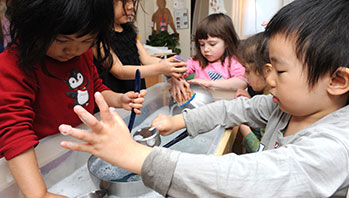- chart paper
- markers
- explore
- librarian
- library
- library card
MA Standards:
Foundational Skills/RF.PK.MA.1a: Handle books respectfully and appropriately, holding them right-side-up and turning pages one at a time from front to back.
Head Start Outcomes:
Social Emotional Development/Self-Regulation: Follows simple rules, routines, and directions.
Social Emotional Development/Self-Regulation: Shifts attention between tasks and moves through transitions with minimal direction from adults.
Social Emotional Development/Emotional & Behavior Health: Adapts to new environments with appropriate emotions and behaviors.
Approaches to Learning/ Initiative & Curiosity: Asks questions and seeks new information.
Language Development/Expressive Language: Uses language to express ideas and needs.
Language Development/Expressive Language: Engages in conversations with peers and adults.
Literacy Knowledge/Book Appreciation & Knowledge: Shows interest in shared reading experiences and looking at books independently.
Literacy Knowledge/Book Appreciation & Knowledge: Asks and answers questions and makes comments about print materials.
Literacy Knowledge/Book Appreciation & Knowledge: Demonstrates interest in different kinds of literature, such as fiction and non-fiction books and poetry, on a range of topics.
PreK Learning Guidelines:
English Language Arts/Language 1: Observe and use appropriate ways of interacting in a group (taking turns in talking; listening to peers; waiting until someone is finished; asking questions and waiting for an answer; gaining the floor in appropriate ways).
English Language Arts/Language 2: Participate actively in discussions, listen to the ideas of others, and ask and answer relevant questions.
English Language Arts/Language 3: Communicate personal experiences or interests.
English Language Arts/Language 5: Listen to and use formal and informal language.
Health Education 19: Practice independence and self-help skills.
Explore Together (indoors): Explore the Library

© Commonwealth of Massachusetts, Department of Early Education and Care (Jennifer Waddell photographer). All rights reserved.
Educator Prep: Plan a field trip to a public or elementary school library. Contact the librarian ahead of time to schedule a short tour if possible. You may want to coordinate your visit with a special library event or story time, or you may want to conduct your own story time at the library.
Tell children you are going to let them explore the library together. Explain that you want them to discover new things about the library.
Allow children to explore freely in the children's section of the library. Engage children in conversation when they look interested or curious about something. Ask questions such as,
- Why do you think all those chairs are in a circle?
- Did you find any books you know? Any books you want to read?
- I wonder why there are so many computers in this area? Why do you think so?
Before leaving the library, check out some books. Allow children to offer book suggestions and to look at your library card and the process of taking books out.
Once back in your setting, gather children in the meeting area and encourage them to share what they learned about the library and what they liked about the library visit. Record new ideas on chart paper (or on the list created earlier in the day). Then hold up a book you chose from the library and read it aloud.
Educator Tip: Introduce the rules of the library. Tell children that it is important to be quiet in the library while others are working. Before you give children time to explore the library, identify the area(s) children can explore, also identify a meeting spot children can easily go to if they are done exploring. Have a grownup remain in the meeting area.
Take It Further: Before you leave the library, you may want to have pairs of children choose a library book from the shelves for you to take out and bring back to the center. Read the books throughout the next two weeks.
